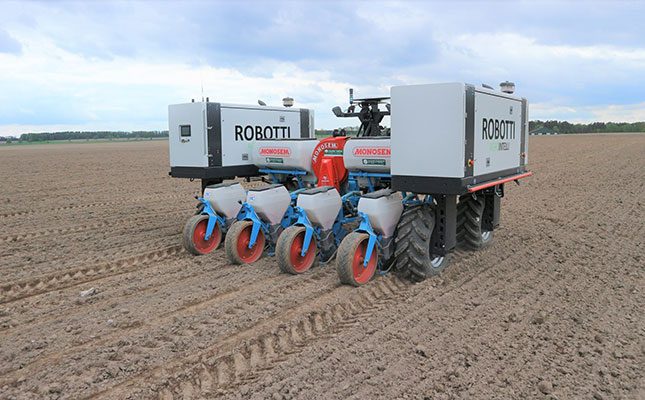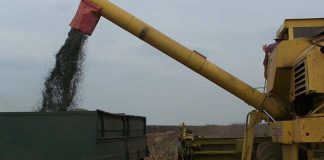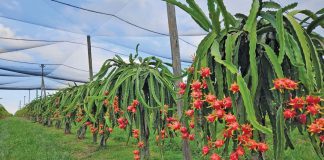
Photo: Lindi Botha
Artificial intelligence
The advancement in artificial intelligence (AI) is perhaps the fastest growing and most promising development we will see this year. As self-driving tractors become a reality, and menial tasks like weeding and harvesting can be done without human intervention, productivity and efficiency gains will be plentiful.
Two examples, launched last year, include the Andela Robot Weeder and the Tortuga AgTech harvester. The Andela is a fully robotised weeding machine with a working width of 9m suitable for crops in row culture.
READ Five devices set to revolutionise agriculture
Each unit has a camera that detects the weeds and controls the linked robot arm, which kills the weeds with a probe while the soil remains undisturbed. The machine runs on solar panels and can be used around the clock.
While the Tortuga’s main function is harvesting, it also collects data for forecasts, treats plants with UV-C light, and performs trimming. The robot’s AI uses nearly 20 ‘models’ to make picking decisions, relies on advanced software for two-arm picking, and navigates in the row precisely.
While costs will initially be prohibitive, especially in South Africa, the technology is set to become more affordable as mass roll-outs begin.
Green footprint scrutiny
Deforestation, carbon footprints and water usage: the eyes of the world are watching. With an ever-greater concern over the human race’s impact on the environment, governments are introducing legislation that will have far-reaching consequences for farmers, especially those focused on exporting to countries where such legislation is already advanced.
READ This is how carbon policies can prevent food insecurity
This year will require a greater focus on measuring and reducing environmental footprints as the EU’s Carbon Border Adjustment Mechanism and its Deforestation Regulation start impacting trade.
This means farmers will need to quantify their carbon footprint and in some cases provide certification that indigenous forests were not removed to make way for agricultural production. As South Africa too has a carbon reduction goal in place, all eyes will be on businesses to measure and reduce their emissions.
Biological leap
With increased scrutiny on crop protection chemicals, and research that supports soil health, the use of biological products is set to increase exponentially going forward.
Donvae Hooker, head of the South African Bioproducts Organisation’s marketing working group, stated that farmers were increasingly opting to lower their chemical use, either because of resistance building up, or because certain active ingredients like chlorpyrifos are being phased out.
Demonstrating the explosion of biological options set for launch this year, start-up incubator AgLaunch has six biological products in their list of 10 top innovations. This includes products that aid soil health and increase plant resilience, as well as bio-fertilisers.
This month, South Africa saw the launch of a venture, NovaLogix, between mega farmers and biological farming advocates ZZ2, and the University of the Free State, to develop probiotics that enhance plant health and growth.
Climate-friendly fibres
The concept around ‘fast fashion’, which sees mass consumption of low-priced clothing that is discarded after only one season, has spurred a new movement towards clothing that is kinder to the environment.
Feroz Koor, sustainability officer at the Woolworths Group, explained that with a greater focus on sustainability, the retailer was exploring alternative fibres like viscose from gum trees, or hemp, which both have a smaller environmental footprint. Clothing that is recyclable and biodegradable is also been trialled.
READ Growing hemp: SA takes a step closer to commercial cultivation
“One of our labels, Witchery, has collaborated with Australian brand KITX on a capsule collection called ‘Towards a sustainable future’. Each piece was made with naturally derived fabrications, including hemp and corozo. Hemp is a fibre derived from the hemp plant that requires minimal irrigation, and little to no herbicides or pesticides to grow. Corozo is the fruit seed of the tagua palm commonly used in the production of sustainable buttons. The collection’s cotton labels were printed with soy ink, and all trims, buttons, zippers, tassels and hangtags were sourced responsibly.”
Offsite desks
The COVID-19 pandemic ushered in a new era of remote work as employees realised that the concept of the home office could be transferred to almost any destination around the world.
Rural tourism saw a spike as long-term rentals were secured to allow remote workers to indulge in the beauty of the countryside while still earning a living. In 2024, this trend is set to continue as remote work becomes a standard operating procedure in companies.
READ Holiday goers flock to farms for health and fitness
Lisa White, director of strategic forecasting at trend analyst company WGSN, noted that this had opened significant opportunities for property owners that could offer office spaces within a rural setting, like on farms. In the year ahead she expects to see the trend going one step further: the outdoor desk.
“People want to spend time outdoors while working. We are seeing outdoor desks popping up all over the countryside in Europe and Britain where glass domes are used to protect people from the elements, while they work in the middle of a forest.”
With far fairer weather in South Africa, the offsite desk is a trend that farmers poised towards agritourism can capitalise on, boosting farming income.












